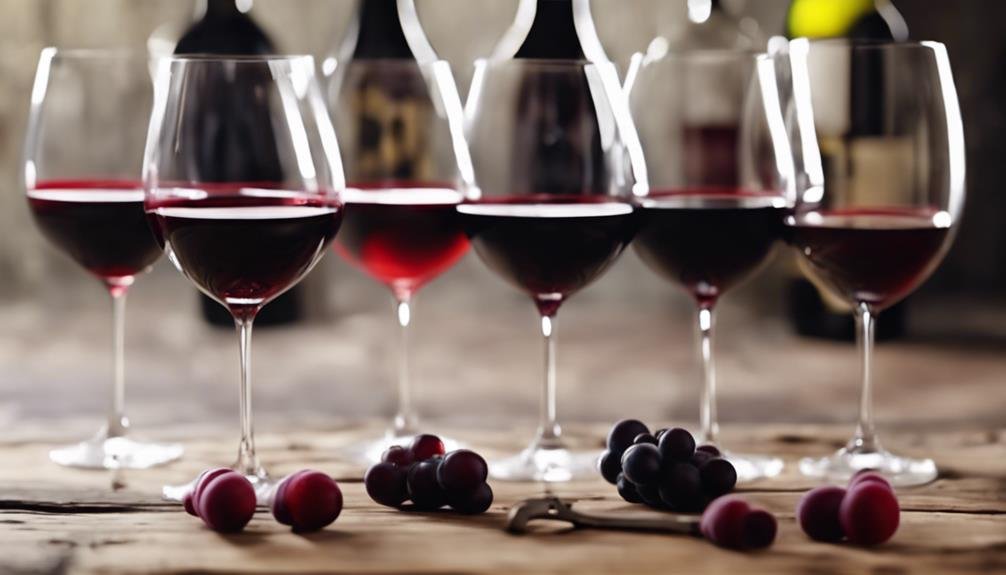To enhance your red wine knowledge, immerse yourself in Bordeaux Classics from France, boasting Cabernet-Merlot blends. Pinot Noir entices with elegance and unique terroir expressions. Prohibition saw the rise of pioneers like Beaulieu Vineyards. Italian reds like Sangiovese and Nebbiolo dazzle with tradition and diverse styles. Spain's wines blend old-world techniques with modern flair. Explore these must-know red wines to elevate your appreciation of the rich world of wine.
Bordeaux Classics
Bordeaux Classics represent the epitome of French winemaking tradition, boasting a rich history and exceptional quality that has captivated wine enthusiasts for centuries. These wines are renowned for their Bordeaux blends, which typically include classic Cabernet-Merlot combinations, showcasing the essence of French elegance.
Originating from the Bordeaux region in France, these wines are often referred to as Claret, a term denoting the original light red Bordeaux wine. The intricate flavors and aromas of Bordeaux Classics have made them a staple in the world of fine wine, with Château Lafite standing out as a prime example of this prestigious winemaking tradition.
The Premier Cru Classification in 1855 further solidified Bordeaux's reputation for producing some of the world's most sought-after wines.
Pinot Noir Obsession
The world of wine connoisseurs is enraptured by the profound allure of Pinot Noir, a grape variety that has sparked an intense and unwavering fascination among enthusiasts and aficionados alike. Known for its French elegance and organic obsession, Pinot Noir has captivated palates with its delicate flavors and aromas.
This grape, grown organically to preserve its essence, produces wines that command high prices for their quality and complexity. The meticulous cultivation of Pinot Noir showcases a commitment to showcasing the terroir and expressing the grape's true character.
Enthusiasts appreciate the finesse and subtlety of these wines, which stand out for their graceful profiles and ability to reflect the nuances of the regions where they are grown.
Prohibition Pioneers

Renowned for their pioneering efforts during the era of Prohibition, certain wineries have left an indelible mark on the history of viticulture with their innovative practices and enduring legacy.
Among these Prohibition innovators, Beaulieu Vineyards Private Reserve stands out for its significant contributions. Founded during Prohibition, this winery, under the guidance of André Tchelistcheff, produced exceptional wines that helped shape the future of winemaking in the United States. Inspired by French winemaking traditions, Beaulieu Vineyards Private Reserve not only survived the challenging times of Prohibition but also acquired the prestigious To Kalon vineyard, further solidifying its reputation.
Through their dedication to quality and French inspiration, these pioneering wineries set the stage for the modern wine industry's success.
Italian Influence
Influenced by centuries-old winemaking traditions and a rich cultural heritage, Italian wines have made a significant impact on the global wine industry. When exploring the Italian influence, it becomes apparent that:
- Italian varietals such as Sangiovese, Nebbiolo, and Barbera are renowned for their unique flavors and characteristics.
- Traditional winemaking techniques, including extended maceration and aging in large oak casks, contribute to the complexity and depth of Italian wines.
- The regional diversity in Italy, from Tuscany to Piedmont to Sicily, offers a wide range of wine styles to explore.
- Italian wines often pair wonderfully with the country's rich culinary traditions, enhancing the dining experience with their vibrant acidity and food-friendly profiles.
Spanish Tradition

Spain's winemaking heritage is deeply rooted in centuries-old traditions that have shaped the country's rich viticultural landscape. Spanish winemakers have long embraced traditional techniques while also incorporating modern innovation to create a diverse range of wines that appeal to enthusiasts worldwide.
| Traditional Techniques | Modern Innovation |
|---|---|
| Aging in oak barrels for extended periods | Experimentation with new grape varietals |
| Hand-harvesting of grapes | Introduction of sustainable farming practices |
| Blending of different grape varieties | Utilization of advanced winemaking technology |
| Emphasis on terroir and regional characteristics | Adoption of organic and biodynamic farming methods |
This combination of honoring tradition and embracing innovation has allowed Spanish winemaking to evolve while maintaining its unique identity and producing wines of exceptional quality.
Frequently Asked Questions
How Did Château Lafite Become King Louis XVS Favorite Wine?
Château Lafite gained King Louis XV's favor through its exceptional quality and Bordeaux history. Its influence on wine legends such as Thomas Jefferson importing it to Monticello solidified its reputation as a premier Bordeaux estate.
What Makes Beaulieu Vineyards Private Reserve Historically Significant?
Beaulieu Vineyards Private Reserve holds historical significance due to its pioneering role during prohibition and winemaking techniques. André Tchelistcheff's influence and acquisition of To Kalon vineyard shaped American winemaking, setting high standards in quality and innovation.
Why Is Secco-Bertani Known for Affordable Dry Wines?
Secco-Bertani is known for its affordable dry wines due to its rich history of winemaking excellence in regions like Veneto, Italy. Their wines boast exceptional taste profiles at accessible price points, making them a popular choice for wine enthusiasts seeking quality without breaking the bank.
How Does R. López De Heredia Viña Tondonia Age Its Wines Obsessively?
- López de Heredia Viña Tondonia ages its wines obsessively through traditional techniques. This includes extended barrel aging, often for decades, and meticulous bottle aging, ensuring complexity and depth. The winery's commitment to time-honored methods results in exceptional vintages.
What Are the Contributions of Château Fortia to the Modern French Wine Classification System?
Château Fortia's influence on the modern French wine classification system is profound. Its historical significance stems from Baron Pierre Le Roy's contributions, co-founding INAO and the AOC system, setting the benchmark for quality standards, shaping Bordeaux's legacy.
Conclusion
In a world where wine enthusiasts seek the finest red wines, Bordeaux classics, Pinot Noir gems, Prohibition pioneers, Italian influences, and Spanish traditions stand out. These wines represent a rich tapestry of history, craftsmanship, and innovation.
Did you know that the global wine market is projected to reach a value of $423.59 billion by 2023? Explore these must-know red wines to experience the timeless allure of the vine.
